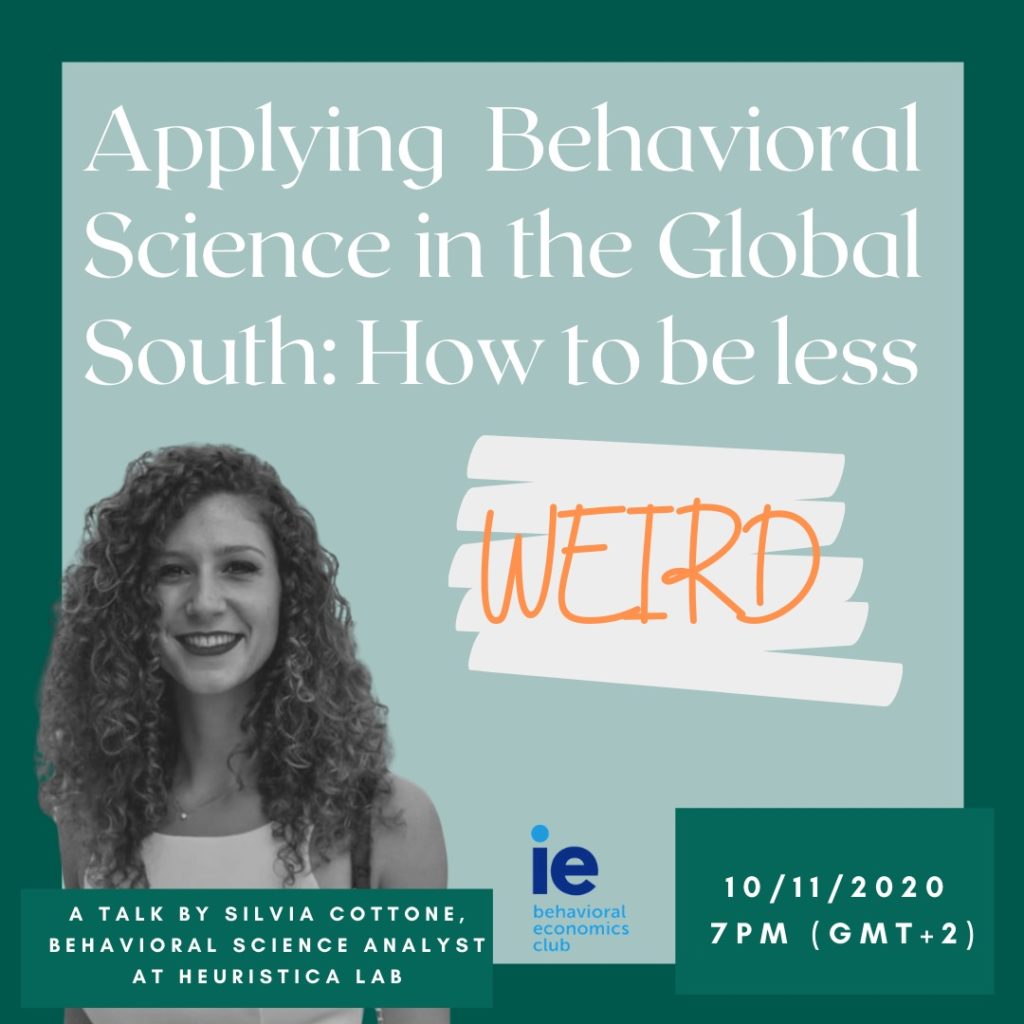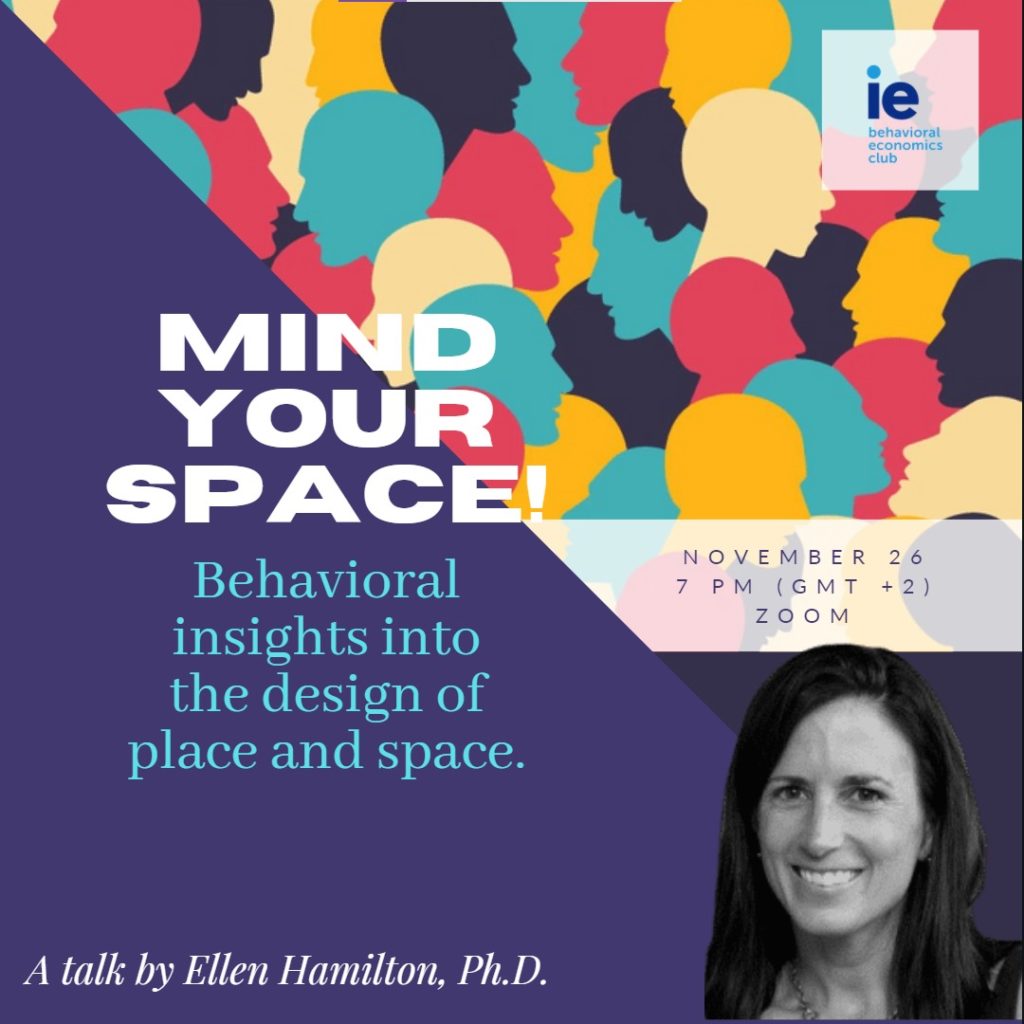Although it is one of the newest professional clubs at IE, the Behavioural Economics Club has grown considerably this past year. Launched in May of 2020, the COVID-19 pandemic presented some challenges for the club, but it didn’t stop them from adapting to the circumstances and growing a huge group of supporters. Although it is based in Madrid, they have hosted all of their events online, giving people from all over the world the chance to join them and learn about the topics that interest them. Their aim is to create a network of students and professionals, who share a passion for learning about the behavioural sciences, creating a space for them to get involved. They have hosted a great variety of events, welcoming professionals and academics from countries like Spain, India, Peru, and many more.
In this interview, IE Behavioural Economics Club President Eduarda Uliana de Gusmão tells us all about the club!
Find out more about the IE Behavioural Economics Club!
What is the IE Behavioural Economics Club?
The IE Behavioural Economics Club is a professional club that aims to bring together people who are passionate about behavioural economics, behavioural sciences and psychology. The club also aims to raise awareness and grow interest in the behavioural sciences field, by giving members an opportunity to learn about the topic and get involved. The club promotes several events with professionals and academics throughout the year, which create a space for students and professionals to expand their knowledge and discuss behavioural sciences’ most recent findings. Beyond that, the club also creates a very diverse and broad network of students and behavioural science professionals who share the same passion. The IE Behavioural Economics Club is for people who want to learn, inspire, and share knowledge about influencing people and making better decisions.
How can people join, contact you, or participate?
Anyone interested in the IE Behavioural Economics Club can join us through the Campus Group platform, and we also have Instagram, LinkedIn and a WhatsApp group. To participate, people just need to stay tuned for our events and register to them. They have all been held online to give people the possibility of joining from anywhere in the world. All our events are promoted through our social media, Campus Group, email and WhatsApp.
What has been your favourite event and why?
My favourite event so far has been Applied Behavioural Economics and Healthy Eating, because it was an event where we could clearly see some theories and concepts of behavioural sciences being applied, and which worked best. This event was very interactive, our speaker was open to answering any questions, and we had the participation of guests from all over the world and from many different backgrounds.
What can students expect from your events?
Students can expect to expand their knowledge and network, to have a space to ask questions and go beyond what they learn in class. Expect to see many applications of behavioural sciences, learn about the latest research, interact with professionals from big companies, and most importantly: learn how to influence behaviour. For example, we had events where we had professionals from Ogilvy who showed us some practical cases within the organisation, academic researchers who presented their research in a fun and interactive way, and professionals who even showed how behavioural sciences are applied to non-WEIRD countries (Western, Educated, Industrialised, Rich and Democratic).
What is the club looking forward to this year?
This year we are looking forward to hosting speakers from bigger companies, planning more interactive events and indeed creating a space for behavioural science students and professionals to engage and learn from each other.
How do you think the club embodies the IE values? (Entrepreneurship, Tech & Innovation, Diversity, etc.)
Since we give the opportunity for anyone inside and outside of IE to join, we have a very diverse public, with people coming from Kenya, Brazil, Argentina, the US., France, The Netherlands, India, Georgia, Italy, Peru and so on. This is particularly interesting for holding behavioural science-related discussions, since it opens a space for different perspectives to be shared. Also, it helps raise awareness about a current issue in the field: that most psychological research is done and sampled in WEIRD countries (Western, Educated, Industrialised, Rich and Democratic).
“The club is always open for suggestions for events, speakers or any activities that students would like to see happening throughout the club. We are also open to possibilities of speakers or even hosting students who would like to come speak at the club, or anything that could be helpful and exciting for the field.”
– Eduarda Uliana de Gusmao
How has the club adapted to the COVID-19 pandemic?
The club was born in the midst of the pandemic, so every one of our events have been successfully held online. This was decided in order to avoid complications and also to give the opportunity for the club to have more speakers from outside Spain, as well as guests connected from anywhere in the world. We also hold all our events at night, most of them at 7pm GMT +2, which is an hour that adapts to most people in the world.
What can a member of your club expect?
Members of the club can expect to engage with professionals, network with others in the field, learn from a broad range of speakers, and participate in exciting competitions and initiatives. The members also have the chance to talk to speakers and ask them questions, so they have a space to raise any doubts or possible discussions that could be interesting to them.
What is your next big initiative/event?
We are very much looking forward to a week of events of behavioural sciences that is being planned for this year, where students are going to be able to participate in many professional events and apply their knowledge to an exciting scenario. We are excited to grow the club and to have events with a bigger impact, where we can keep spreading our love for BeSci and raise awareness for the field while creating the opportunity for students to engage with other professionals from the same field.
Find more about them on LinkedIn, Instagram, and WhatsApp.
Editorial note: This article was created in association with Campus Life as part of their Meet The Club initiative.








